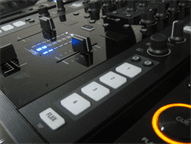Sync is not the problem, a lack of creativity is
Wednesday, July 13, 2016
by Tat
A few weeks ago a story appeared on the web about a California club owner telling laptop DJs they were no longer welcome. Cure and Clause owner Kenny Summit said: “Keep your controller in your crib. Don't come to work with your training wheels”. The comments stoked yet more debate in the DJ community with arguments in praise and against the club owner's statement. It reached as far the UK national press with such as The Guardian newspaper giving it coverage. High profile DJs such as Richie Hawtin and Seth Troxler waded into the debate stirring up even more social media debates. Comments in The Guardian article went as far as the vinyl versus digital argument rearing its head once again and so did the subjects of cheating, laziness and creativity.
Digital DJing has meant a lot more people can try their hand at mixing music and you no longer need controllers or a laptop to DJ. Everyone can put together seamlessly mixed collections of their favourite floor fillers with very little practice on just a tablet device, something we will look at in a future article. Whilst there is no problem with that, there is a problem with DJs turning up to clubs and bars and doing the bare minimum to play a set. The question is, who is to blame here and what can be done to ensure those being paid to play in clubs are bonafide creative DJs rather than just push the odd button here and there? We thought it would be good to speak to a DJ who operates on both sides of the fence. As a DJ who started out with vinyl in the 1990s and then adapted to a variety of digital platforms including CDJs and laptops we asked DJ CPSmith from the popular Computer Club night, and a regular at Algorave whether the problem was the sync button or are we missing out on the real point?

Sync hate
One of the biggest criticisms in recent years has been the use of the sync button, it can be seen by those in the vinyl camp as lazy and a cop out, whilst those on the digital side as an evolutionary step. Some DJs have been highly critical of digital DJs with the sync function often being kicked about. A recent, well-thought out opinion piece in Resident Advisor titled 'Are we in danger of accepting laziness in the DJ booth?' by Ryan Keeling argued that we are. Laziness has always been the case, after the acid house explosion many more DJs appeared on the scene and did the bare minimum in searching out new tracks and the effort employed behind the decks. Yet technology, if left unchecked, can make us lazy, accept mediocre and even constrain us. There will always be a percentage of DJs whose priority is to be 1) famous 2) impress the opposite sex 3) be cool. Are they the priority of the true DJ? The answer you would get from any proper DJ would be no, it is the music and desire to entertain and educate others, everything else is a bonus. So with digital DJing now the mainstream and more people taking to the hobby/profession than ever, will we see more laziness and less creativity? Is the sync button at fault here or does it give us more freedom and therefore creativity? Electro and techno DJ CPSmith thinks it is the latter and those open-minded enough should move on to leave the rest behind.
Does DJing from just a laptop send out the wrong message?
If we look at other professions, such as prohography, we don't see paid professional photographers using their phones or tablets to take pictures, yet on the other hand laptops are essential to them. Why should having a laptop to DJ be any different? CP Smith see it like this; It sends the wrong message to some, but it depends on what level you are DJing. It can be problematic if space and schedule are tight and ultimately could lead to the promoter not choosing you. There are also the sound quality issues that come with laptop / controller setups, many of which have a low line levels.”
Sync as a means to an end
We all know the one main benefit of a sync button, that it can make DJing easier, or at least less time consuming as you try and keep two tracks in time. Yet what are the benefits we don't discuss and what are the cons that come with that ease? Often we hear that it gives DJs time to think about what they are going to play next, whilst the whole argument can't be helped by the more populist DJs using that time to take selfies and hold their arms in the air. CP Smith believes it makes things happen quicker not easier. “The sync button isn't that button on a synthesiser that gives you a hit record, the musicians union once thought this and tried to ban Gary Numan! The sync button is a tool that DJs can use to help them get on with what they're doing. Beat grids don't always sync beats to the point of no intervention. There is skill involved, the pitch adjusting time that syncing saves can be spent reading the crowd, selecting the next track or getting creative with effects and loops. If you care about your mixes and are experienced, the sync button allows you to flourish. What I find most disappointing are that some DJs really hate the sync button and laptop DJs for that matter. Should we have another button that pours beer on the decks, and DJs who press it get more respect?”
Going back to the original story that spurred this article on, the problem of DJs with laptops and to a much wider extent, different configurations, is it reasonable for club promoters to expect most DJs to conform to a simple set of parameters, such as CDJs and turntables? The Computer Club co-host and CPU Recordings label owner thinks there is room for accommodation. It is reasonable as it's their club, but on the other hand, if they really want a DJ they should accommodate them. If you are a DJ and want to play somewhere - find out what the promoter prefers and don't be stubborn.
CPSmith thinks DJs should be doing more of to embrace the new technology they have at their disposal. “DJs should experiment. They should have a go on different setups and don't get stuck in a rut. I remember in 1991 hearing a Sasha mixtape, it was awe inspiring to listen to what he did with just two turntables. Counting bars to drop the next record, finding the breakdowns, overlaying accapella's etc, this shaped my DJ style forever. I was stuck with that same formula (2 turntables) for a good 15 years, but in around 2003 I discovered Traktor. I had already been experimenting mixing waveforms in Protools in the late 90s but with a small hard drive and before audio-flexing it was a nightmare. Traktor's beatgrid/sync gave me such a buzz as I could perfect mixes I only dreamt of years before. I actually side-stepped the CDJ revolution due to being an early laptop DJ and still played vinyl. Recently the new CDJ2000s have caught up with the likes of Traktor, and I've just got a pair, ironically the XDJ-1000s that don't have a CD slot! This means I can DJ in clubs with just a USB drive - which is a great relief from lugging a fragile laptop and controller around. Just as a laptop and controller was a great relief from lugging a record box around 10 years ago! Finally, CPSmith offers a piece of advice that any DJ, veteran or just starting out should always keep in mind. “There are learning curves with any new setup, go play on something different, you might be surprised.”
No excuses
There is no excuse to be creative when DJing these days, whatever format or technology you are using. Let us now forget some of the greatest mixes and moments in dance and urban music happened with turntables. Grandmaster Flash's 'Adventures on the Wheels of Steel' in his kitchen; The K&D Sessions by Kruder and Dorfmeister and finally Journeys by DJ from Coldcut. Even if you search YouTube you will find various examples of incredible dexterity and creativity by DJs using reel to reel tapes, so the digital DJ has very little excuses. The thing to remember is that creativity is not about showing off all the things your kit can do, some of the best DJs and mixes are pure simplicity. The idea of mixing tracks that no one could imagine together or introducing effects and loops can make not just good mixes, but almost live re-edits. If you watch the likes of Jeff Mills DJ, even after all these years, he does not stand still, he is constantly tweaking, refining and re-inventing - DJing is a creative experience, if you let it be.
My own first experience of the sync button about six or seven years ago at a friend's house. He had recently purchased a copy of Traktor and showed it me on his laptop, with a minute's tuition I was able to mix three tracks, without headphones, perfectly for four minutes - I had never heard the tracks before in my life. I learned in time about the various other cool things you could do with loops and effects, and with tools like Ableton you could craft the most perfect and inventive of pre-recorded mixes. Sync can make you reliant on just cue, sync, repeat if you are not inclined to explore the possibilities further. If that is the case, what are you doing in the DJ booth?
Are we in danger of accepting laziness in the DJ booth?
A California club bans DJs who use laptops... but why?
CPSmith
Be creative with music discovered with Trackhunter







